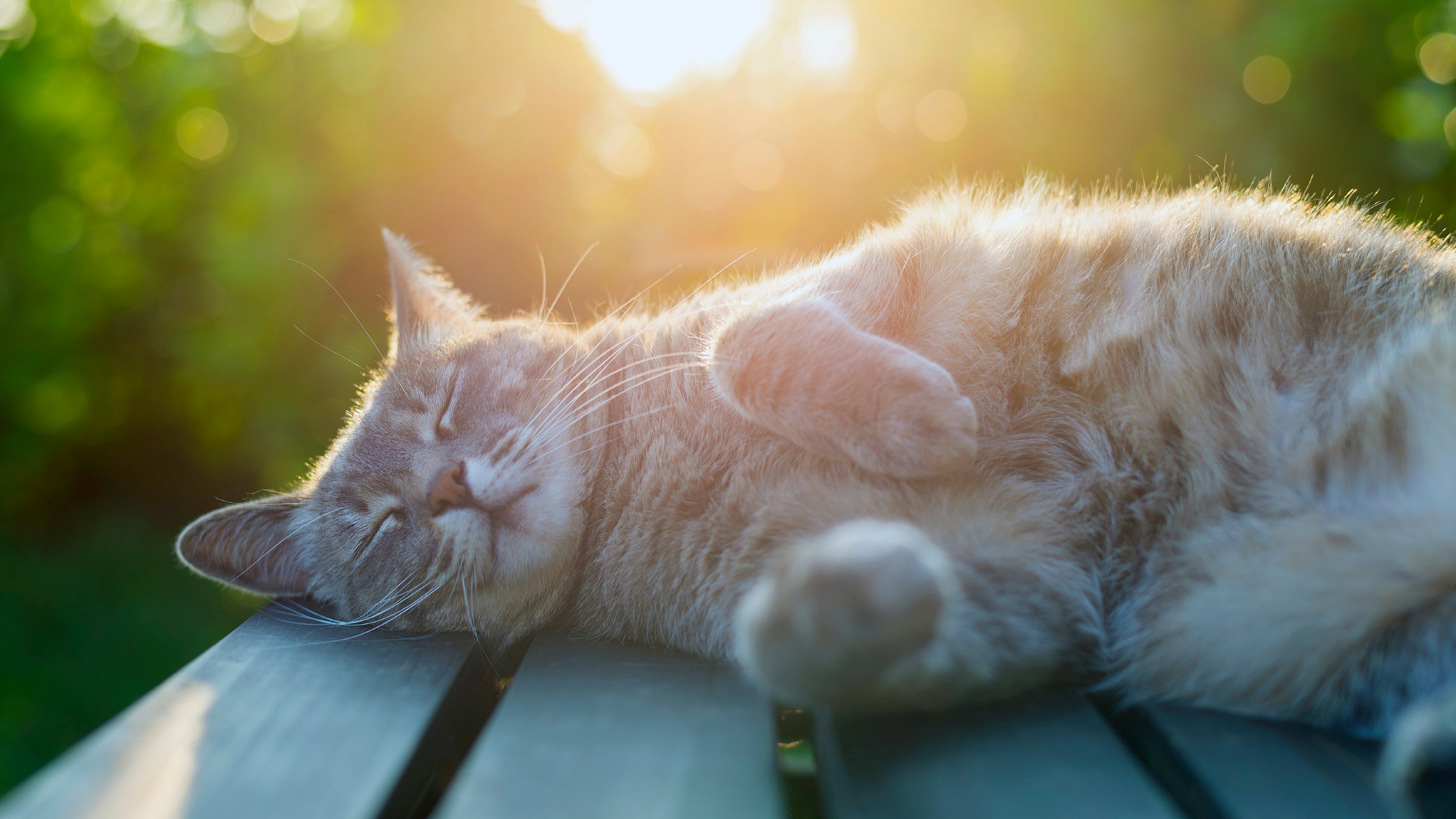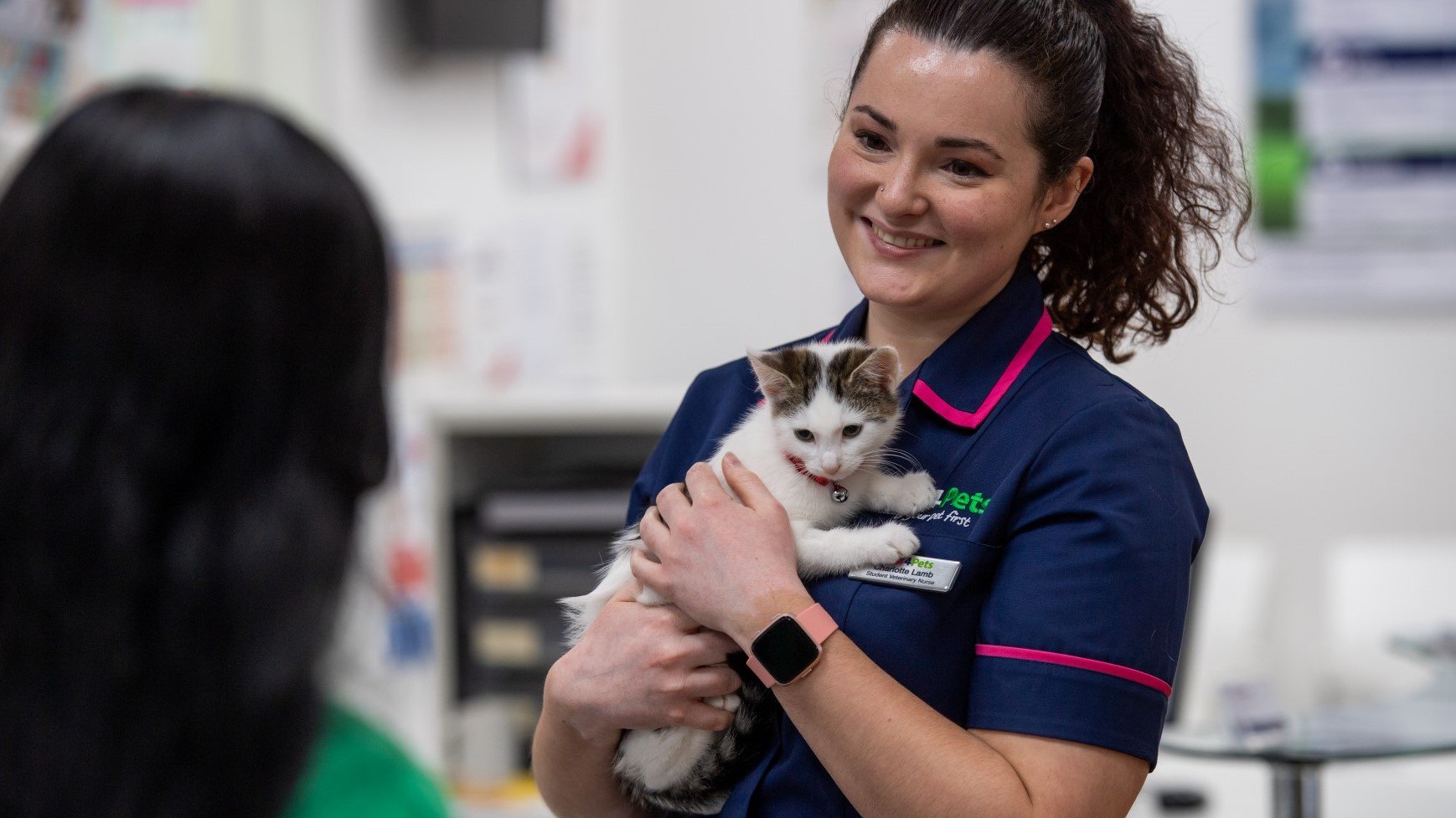
Sunburn in Cats
Just like us, cats love a sunny spot where they can lie down and soak up the warmth. But did you know that, also like us, can get sunburnt?
Most of the time, a cat’s dense fur coat can protect their skin from harmful ultraviolet rays, but where the fur is thin or missing, or where the skin or coat is light coloured, the risk of sunburn increases.
The commonest sites for sunburn in cats are the ear tips, face and tummy. Not only is sunburn painful for a cat, but chronic exposure to strong sunlight and repeatedly getting sunburnt greatly increases the risk of skin cancer.
So, what are the signs that your cat might be getting too much sun? What should you do about it if you think your cat has sunburn? And how can you prevent sunburn in cats? Always contact your vet team for advice if you have any concerns about your cat’s health.
Symptoms of sunburn in cats
By the time you see signs of sunburn in your cat, there will already have been some ultraviolet damage to the skin, so it’s important to be aware of the symptoms.
The most likely places you’ll see signs of damage are on the tips of the ears, the nose and on the areas just between the eyes and ears, where the hair is very thin. Sunburnt skin in cats can look pink or red, scabby or crusty. The tips and edges of the ears could appear swollen, and your cat might paw or scratch at the affected areas, they might twitch their ears, or they may be worried about letting you look.
Cats who have severe sunburn may also become dehydrated and the heat can have a detrimental effect on all their body systems, so it’s important to contact your vet straight away if you think this might have happened.
If your cat’s skin suffers repeated sun exposure, they may develop a common type of skin cancer called squamous cell carcinoma (SCC). This must be treated seriously to avoid severe and possibly fatal consequences. Cats who develop SCC on their ear tips normally need to have their ear tips amputated.
Always ask your vet to check your cat if you see scabby or non-healing wounds, or dark patches on skin that gets exposed to the sun.
What is the treatment for sunburn in cats?
If you think your cat could have sunburn, bring them indoors out of the sun, and contact your vet for advice. Depending on severity, your vet may ask you to bring your cat in to the clinic, where they can assess the burns and begin treatment.
Sunburn is painful, but cats don’t often show outward signs of pain, so treatment normally involves pain relief, as well as cleansing or flushing severe lesions, topical medications or dressings, and antibiotics if the burns have become infected. Sometimes, cats with severe sunburn need to be hospitalized so that they can be placed on a drip to correct dehydration and to support them while they go through the most vulnerable phase.
If the sunburn is mild, your vet may recommend home treatment, such as using cold compresses to relieve the pain and inflammation. Many home remedies we might use for ourselves, such as essential oils, are toxic to cats, so don’t be tempted to use them.
While your cat is recovering from sunburn, keep them indoors to prevent further skin damage and consider prevention measures.
How to prevent sunburn in cats
It’s not easy to influence where cats go when they have access to the outdoors, which makes it difficult to keep them in the shade on sunny days. White cats, cats with large areas of light-coloured hair or pink skin and those with no hair are at higher risk of sunburn and it’s safest to keep them indoors during the brightest and hottest times of the day. For other cats, or those you can’t confine, you may need to think about using a cat-safe sunscreen to protect their skin.
Many of the ingredients used in sunblocks are toxic to cats when ingested, so always choose a cat-safe sunscreen for them. Sometimes, even products that are suitable for dogs are unsafe for cats. If you’re not sure whether a product is appropriate for your cat, contact the manufacturer for guidance. Never be tempted to use sunblock designed for humans on your cat as it could make them unwell.
Before you use cat sunscreen, test it on a small area of skin to make sure it’s okay for your cat. Apply it and wait for 24 hours to make sure there is no skin irritation. Cats often lick off products from their fur and skin. If this happens, keep a close eye on them and let your vet know if you see any signs they may have reacted to the product, for instance vomiting or diarrhoea. Adverse reactions are unlikely with a cat-safe sunscreen, but it is best to be careful. Once you’re happy that the product is suitable, apply it to all vulnerable areas and repeat according to the directions on the packaging.
FAQs
Human sunscreen contains chemicals that absorb or reflect the harmful UV rays to prevent them from damaging the skin. Common ingredients used in human sunblocks include zinc and salicylates, which can be toxic to cats when licked off. Even some products that are safe for dogs are unsuitable for cats. For this reason, always use a cat-safe sun cream and check with the manufacturer if you’re uncertain whether a sunscreen is appropriate for use in your cat.
All cats can get sunburn if their skin is exposed to enough harmful ultraviolet rays from the sun. Although cats with light or white fur and pink skin, and hairless breeds of cats are at much higher risk, anywhere the hair is thin or missing, even on a black cat, it is susceptible to sunburn. So, even black or dark-coloured cats should be protected from strong sunlight, either by keeping them indoors during the brightest part of the day or by using a cat-safe sunblock.
Cats can develop a kind of skin cancer called squamous cell carcinoma (SCC) if their skin is repeatedly exposed to strong sunlight. The most commonly affected areas are the ear tips and the nose. If you see dark patches appearing on your cat’s skin where there were previously none, or scabs, non-healing wounds, or crusty areas that don’t settle down, always ask your vet to take a look. SCC requires aggressive treatment to prevent serious or fatal consequences, and it is treatable if caught in time.
Health Plans to keep your cat healthy
At Vets4Pets we offer a range of Health Plans that make essential routine treatments more affordable. You'll save money on things like annual vaccinations, flea and worm treatment and routine health check-ups.

Cat Advice
Read more of our expert cat advice to keep your cat happy and healthy.
